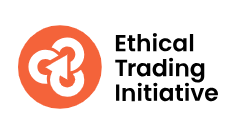
ETI – Ethical Trading Initiative
The Ethical Trading Initiative (ETI) is an alliance of companies, trade unions and voluntary organisations. ETI works globally to improve working conditions for people who grow raw materials or produce consumer goods. Audits focus on freedom of association, no child labour and secure healthy working conditions.

Ethical Trading Initiative
About the standard
The Ethical Trading Initiative (ETI) is an alliance of companies, trade unions, and voluntary organizations.
ETI works globally and is aimed at organizations that grow raw materials or produce consumer goods. Audits focus on freedom of association, prohibition of child labor, and ensuring healthy working conditions.
Requirements
The ETI Base Code is founded on the conventions of the International Labour Organisation (ILO) and is an internationally recognized code of good labour practice. It is viewed as a global reference standard and is widely used as a benchmark against which to conduct social audits and develop ethical trade action plans. Applying this code is expected to comply with national and other applicable laws for every organization.

Features
Trading initiative
Basic code
Documents
Application Form ETI
Learn more about ETI
ETI Base Code
For 20 years, ETI and its members have been a driving force in ethical trade. We influence businesses to act responsibly and promote decent work. Together, we tackle the complex challenges of today’s global supply chains, improving the lives of workers worldwide.

How can we help you?
Want to apply for a certification program? Our Certification team will be happy to help you.